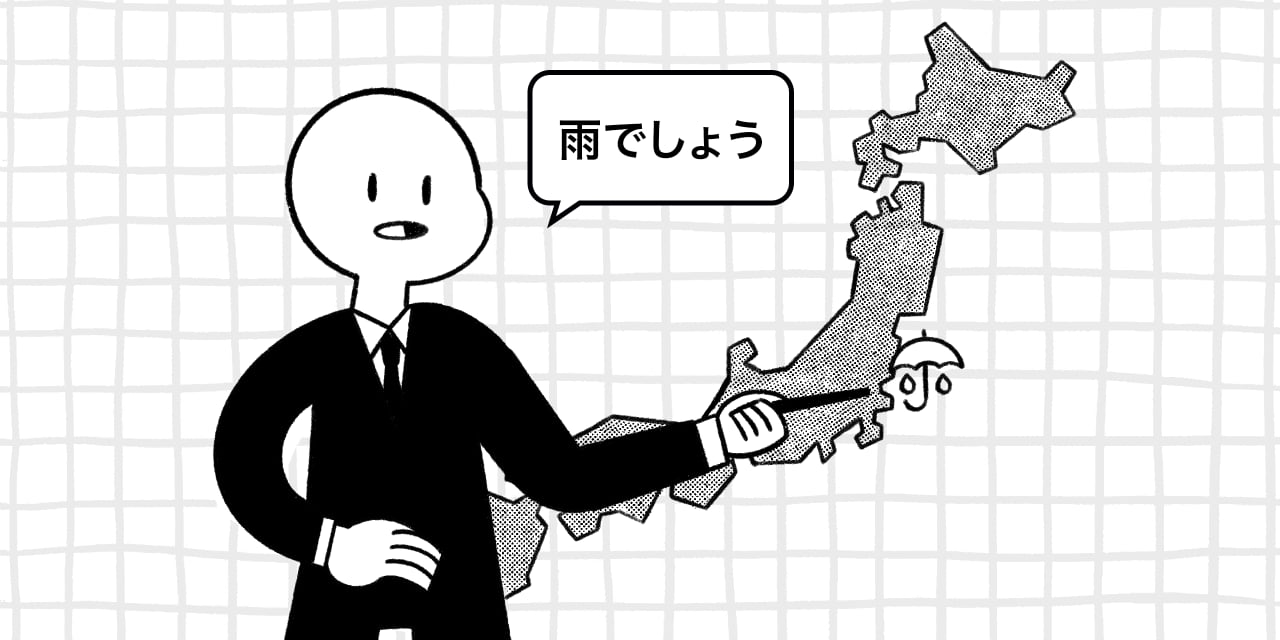Table of Contents
- What Is でしょう?
- でしょう for Speculation
- でしょう for Showing Shared Understanding
- でしょう for Seeking Agreement
- でしょう with Question Words
What Is でしょう?
でしょう is one of the grammar items to express speculation. It indicates that the speakers assert their speculation based on their interpretation of something, without any objective evidence to prove it. Before learning how to use でしょう, let's review how to make sentences.
It can come after nouns, adjectives, and verbs, in both positive and negative forms.
Noun + でしょう
| Positive | Negative |
| 明日は雨でしょう。 | 明日は雨ではないでしょう。 |
| (I assume) it will rain tomorrow. | (I assume) it won't rain tomorrow. |
な-adjective + でしょう
| Positive | Negative |
| 彼女は 綺麗でしょう。 | 彼女は 綺麗ではないでしょう。 |
| (I assume) she is cute. | (I assume) she isn't cute. |
い-adjective + でしょう
| Positive | Negative |
| テストは難しいでしょう。 | テストは難しくないでしょう。 |
| (I assume) the test is going to be difficult. | (I assume) the test is not going to be difficult. |
Verb + でしょう
| Positive | Negative |
| コウイチは負けるでしょう。 | コウイチは負けないでしょう。 |
| (I assume) Koichi will lose the game. | (I assume) Koichi will not lose the game. |
To make past sentences, you have to change the form of the words that come before でしょう.
- 昨夜は雨だったでしょう。
- (I assume) it rained last night.
- コウイチはテレビを買ったでしょう。
- (I assume) Koichi bought a TV.
でしょう for Speculation

While these sentences are grammatically correct, you might not often hear people use でしょう to speculate something. Indeed if you say 明日は雨でしょう to your friend, it sounds like you are imitating a weather forecast. Why?
Remember speakers are emphasizing that they are providing their own opinion and interpretation for their listeners when using でしょう. This creates an assertive and authoritative tone in speech as if the speaker is some sort of professional.
でしょう for Showing Shared Understanding
Another function of でしょう is showing shared understanding, which can often interpreted as confirming information. This is the case when speakers speculate something about their listener:
- Jenny: LAで働いています。
Koichi: そうなんだ。毎日、通勤大変でしょう。 - Jenny: I work in LA.
Koichi: Really? Commuting every day must be tough for you.
In this conversation, でしょう indicates that Koichi treats his speculation of Jenny's situation as if he knows it is true, which creates the feeling of empathy.
In other situations, でしょう indicates that speakers treat their speculation as something so obvious that it should be easily accepted by their listener, which creates a different nuance.
For example, in the following conversation, でしょ indicates that Mami is implicitly suggesting that they shouldn't worry about Koichi. In a casual conversation like this, でしょう is often shortened to でしょ.
- Kanae: コウイチ、遅いね。大丈夫かな。
Mami: いつも遅いから、大丈夫でしょ。 - Kanae: Koichi is late. Is he okay?
Mami: He's always late, so I guess he's fine.
でしょう for Seeking Agreement
In other contexts, でしょう can be used to seek someone's agreement. Imagine a situation where you give your friend some homemade cookies. To make sure that your friend is enjoying them, you can say:
- どう?美味しいでしょう。
- How are they? They're good, huh.
You can say the same sentence in a rising intonation, which emphasizes the feeling that you are trying to make your listener say yes.
- どう?美味しいでしょう?
- How are they? They're good, huh?
While we've discussed situations where speakers assume their listeners agree with their view, でしょう can also be used when speakers know that their listeners don't agree with their standpoint. In this case, you would sound as if you're imposing your opinion on the listener.
For example, imagine a situation where a kid is crying. Her mother loses her patience and yells at her child:
- 泣かないの。お姉ちゃんでしょう。
- Don't cry. You're a big girl.
The same sentence can be pronounced with rising intonation at the end of the sentence. It makes the mother sound as if she is seeking confirmation from her child:
- 泣かないの。お姉ちゃんでしょう?
- Don't cry. You're a big girl, right?
でしょう with Question Words
In conversation, でしょう can also be used in information-seeking questions. In this case, question words such as なん, だれ, どこ, いつ, and なんで are often used together with でしょう. This adds a higher level of formality to the question.
For example, your speech is very formal when you say:
- どなたでしょう?
- Who are you?
か is often put at the end of a sentence. It doesn't change the meaning of sentences very much, but か makes it clear to the listener that the sentence is a question:
- どなたでしょうか?
- Who are you?
While か is optional in wh-questions, it is necessary when we ask yes-no questions.
- お困りでしょうか?
- Are you confused?
If we drop the か, it sounds like the speaker is confirming that their listener is looking for something:
- お困りでしょう?
- You are confused, aren't you?
Now you know how to use this grammar point, でしょう? Take a quick break, and when you have energy for more Japanese learning, check out our page on だろう, so you can learn to guess and surmise in a less formal way.